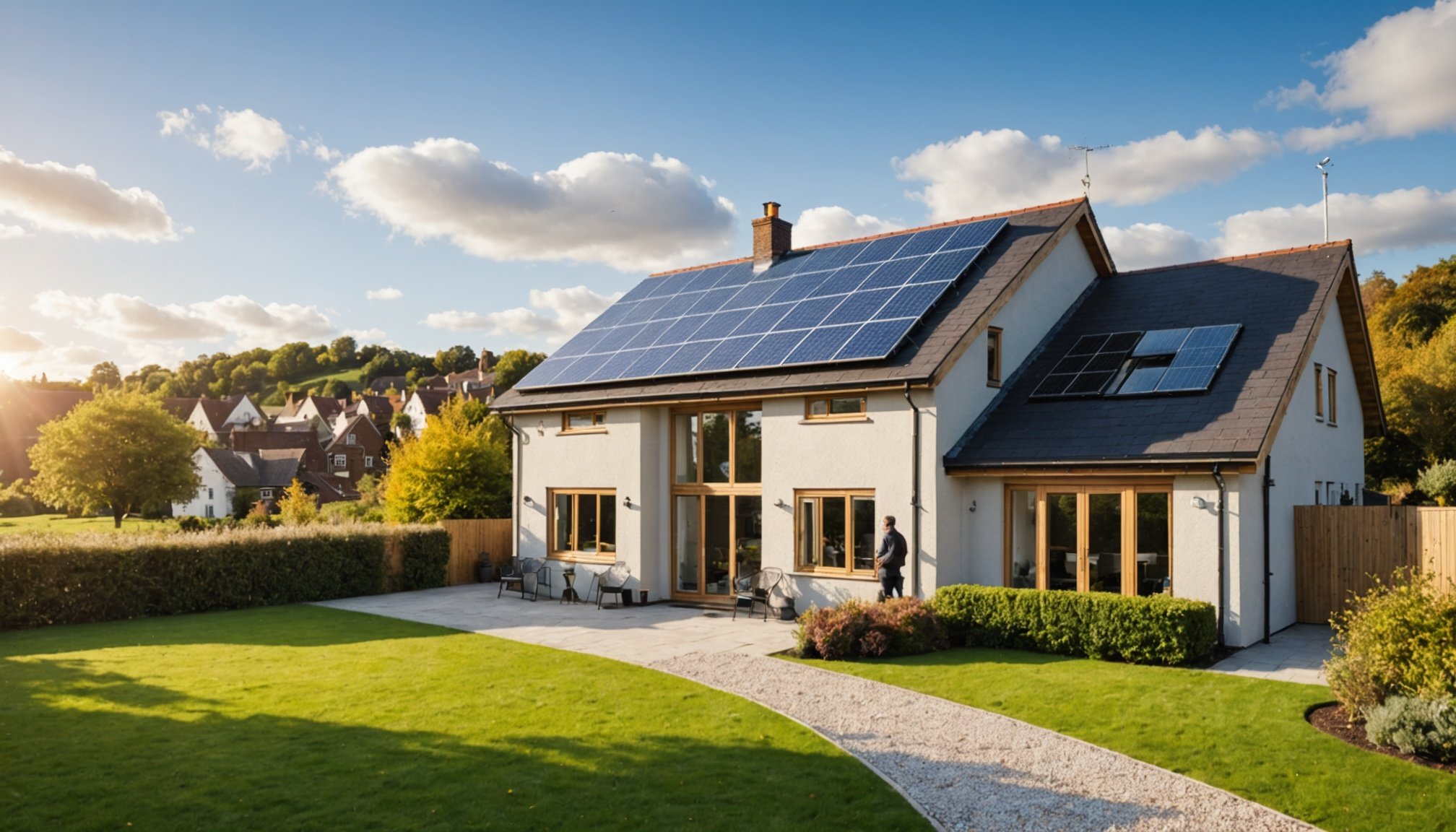Overview of Renewable Energy Financing for UK Homeowners
In the UK, renewable energy financing is becoming increasingly essential for homeowners looking to invest in sustainability. With the push towards greener solutions, the market offers numerous investment options. As energy costs rise and climate change becomes more pressing, many UK homeowners are considering renewable investments to counteract these challenges.
The landscape of renewable energy financing in the UK is evolving, with various key trends shaping the available options. Government initiatives play a crucial role by providing financial incentives and guidance for these investments. In addition, private financing options are gaining popularity, offering competitive rates and flexible terms to attract environmentally conscious homeowners.
Additional reading : Mastering uk property investment: your essential roadmap to successful crowdfunding in real estate
The importance of renewable energy investments lies in their dual benefits: reducing household energy bills and contributing to environmental conservation. Homeowners investing in renewable solutions not only enhance their property value but also benefit from potential savings and financial incentives.
Understanding these trends and the broader market environment enables homeowners to make informed decisions regarding their investment. As the renewable energy sector grows, so does the range of available investment options, providing homeowners more choices to align with personal and financial goals. With these insights, UK homeowners can better navigate the renewable energy financing landscape.
Additional reading : Navigating the uk property tax maze: essential insights for buy-to-let investors
Types of Financing Options Available
Navigating the myriad of financing options is essential for UK homeowners aiming to invest in renewable energy. Understanding the benefits and mechanisms of each option can significantly aid in making informed decisions.
Government Grants and Subsidies
Government initiatives play an influential role in promoting renewable energy investments. Grants and subsidies are accessible for an array of projects, providing monetary support that reduces the financial burden on homeowners. These incentives often cover a portion of the installation costs or offer rebates on projects, thus stimulating interest in green upgrades.
Green Loans and Mortgages
Green loans and mortgages present another viable avenue for financing renewable projects. Many financial institutions offer green loans at competitive rates, tailored specifically for homeowners seeking energy-efficient solutions. These loans not only support the initial investment but also offer extended repayment terms, making them a practical choice for those committed to sustainability aims.
Private Financing Solutions
Private lenders have become pivotal in shaping the renewable energy financing landscape. Increasingly, they offer customizable solutions that are both flexible and competitive. Private financing may include equity releases or tailored loan packages that align with the specific needs of environmentally conscious homeowners, providing a robust alternative to traditional financing methods.
Eligibility Criteria for Financing
Navigating eligibility criteria is crucial for UK homeowners pursuing renewable energy financing. Each financing option has specific requirements that applicants must meet to qualify for resources like grants, loans, and incentives. Understanding these financing requirements enhances the likelihood of accessing funds.
Common eligibility prerequisites often include property ownership status, proof of income, and creditworthiness. UK regulations might also dictate specific environmental assessments or installation certifications. Meeting these standards ensures that applicants are considered for a broad range of financing options.
Homeowners can boost their eligibility by improving their credit scores and maintaining accurate financial records. An external energy assessment can also verify compliance with energy standards, further strengthening an application. The documentation process is integral; necessary paperwork typically includes proof of identity, property details, and detailed proposals for planned renewable investments.
Accurate application preparation and comprehension of UK regulations enable homeowners to align their financial documentation with lenders’ stipulations, thereby enhancing approval chances. Knowing the financing requirements and pre-arranging compliance checks saves applicants from frustration and delays in securing financing. By adhering to these criteria, homeowners optimize their ability to fund sustainable investments effectively.
Benefits of Renewable Energy Investments
Investing in renewable energy is increasingly attractive for UK homeowners, given the numerous benefits of renewable energy solutions. Financially, these investments can significantly lower household energy bills, offering homeowners tangible savings. Ongoing tax incentives and rebates further enhance these financial incentives, rewarding those who adopt sustainable energy practices.
From an economic perspective, renewable energy investments often lead to a positive return on investment (ROI), bolstered by reduced utility expenses and potential appreciation in property value. Analysing long-term savings against the initial investment reveals a compelling case, wherein initial costs are frequently offset over time through enhanced energy efficiency and government-backed financial benefits.
Environmentally, embracing renewable energy supports broader sustainability goals. It contributes to reducing carbon footprints and promotes cleaner living environments. These ecological benefits cater to the growing demand for green initiatives, aligning individual homeowner goals with global ecological ambitions.
Exploring the benefits of renewable energy translates into informed decisions on sustainability investments. UK homeowners who prioritize such solutions can achieve cost savings, leverage available financial incentives, and contribute meaningfully to environmental conservation—making renewable energy an informed and beneficial choice.
Application Process for Financing Solutions
Understanding the application process for renewable energy financing is essential for UK homeowners aiming to secure the best options. The process can be broken down into clear steps, ensuring a seamless journey from application to approval.
Initially, applicants need to research various financing solutions available. Start by determining eligibility for grants and loans, aligning with specific energy needs. This involves comparing offers from government schemes, banks, and private lenders to find the most suitable terms.
Once an option is chosen, gather the necessary documentation—proof of income, property details, and any past energy assessments. Submit these with completed applications to lenders or grant providers, ensuring accuracy to avoid delays. It is critical to keep an eye on timelines, as waiting periods can vary greatly between providers. Prepare for possible assessments or interviews as part of the review process.
Common pitfalls include incomplete forms and overlooking specific criteria. By anticipating these, applicants can mitigate risks and improve approval chances.
Following these steps rigorously allows homeowners to navigate the application process effectively and positions them strongly to secure renewable energy financing that aligns with their needs and objectives. This structured approach bridges the gap between ambition and successful investments.
Cost Comparison and Return on Investment
Embarking on renewable energy projects requires a clear understanding of the cost comparison and return on investment. The initial costs vary significantly depending on the chosen technology. For instance, solar panel installations might entail upfront expenses covering equipment and labour, whereas wind turbines could present different cost dimensions. Understanding these variations helps homeowners effectively plan their financial outlay.
By investing in renewable technologies, homeowners can anticipate projected savings. Energy savings primarily stem from reduced reliance on traditional energy sources, leading to decreased utility bills. Furthermore, as technology improves, efficiency gains amplify these savings, gradually offsetting the initial spend.
To facilitate financial analysis, homeowners can leverage tools for calculating ROI. Tools such as ROI calculators or financial software provide insights into potential returns based on current energy expenses and anticipated savings. This analysis aids in gauging when break-even points might be achieved and the overall financial viability of a project.
In summary, a thorough cost comparison alongside projected savings generates a transparent view of the financial landscape. This equips UK homeowners with strategic knowledge, aiding informed decision-making about renewable energy investments.
Case Studies: Successful Renewable Energy Investments
Examining case studies offers valuable insight into successful renewable energy projects undertaken by UK homeowners. These success stories illuminate the diverse pathways individuals can take towards sustainable investments, showcasing not only financial gains but also enhanced property value.
In one instance, a homeowner in Surrey utilized a combination of government grants and private loans to install solar panels and efficient heating systems. This strategy resulted in a 60% reduction in energy bills within the first year. The dual financing method facilitated access to immediate funds while benefiting from financial incentives and tax breaks. This approach highlights the benefit of leveraging diverse funding sources to maximize investment returns.
Another notable example is a household in Cardiff that opted for a green mortgage to support the installation of a small wind turbine. The project not only boosted energy efficiency but also increased the property’s market value by approximately 10%. Such success stories emphasize the favourable impact of renewable systems on long-term property valuation.
Through these case studies, UK homeowners can glean practical lessons in navigating investment options, optimizing the potential of renewable energy solutions, and aligning with government support and market opportunities.
Tips for Maximizing Renewable Energy Investments
Maximizing returns on renewable energy investments requires strategic planning and ongoing management. Homeowners in the UK can enhance the efficiency of renewable systems by adopting targeted strategies.
Strategies for Enhancing Efficiency
Investing in advanced technologies and ensuring proper installation can significantly improve system performance. Homeowners should consider the benefits of smart energy management systems and regular energy audits to identify areas for optimisation.
Importance of Regular Maintenance
Regular maintenance and upgrades are crucial for sustaining performance levels of renewable installations. Scheduled inspections and immediate rectification of any issues can prevent larger, costly repairs, ensuring systems operate at peak efficiency.
- Check for damage or wear on components like solar panels or turbines.
- Clean systems to enhance productivity and efficiency.
- Update technology to newer, more efficient models over time.
Community Programs and Resources
Engaging with community programs can offer additional support. These programs often provide resources and incentives that can facilitate further improvements in energy efficiency. Homeowners can benefit from collaborations or bulk buying schemes, which may reduce costs significantly.
By implementing these investment tips, UK homeowners can increase their return on investment while contributing to wider environmental goals. Ultimately, embracing efficiency improvements helps sustain financial and ecological impacts of renewable energy projects.
Cost Comparison and Return on Investment
Understanding the cost comparison and return on investment (ROI) is vital for UK homeowners considering renewable energy projects. The initial costs differ notably based on technology choices. For example, solar panel installations often involve significant upfront fees, covering both equipment and labour costs, whereas wind turbines might demand different financial commitments. Clearly grasping these distinctions assists homeowners in budgeting effectively.
Projected savings are a critical component of this investment. By reducing reliance on traditional energy sources, homeowners benefit from decreased utility bills. As technology advances, the efficiency of these systems improves, enhancing energy savings and gradually balancing out initial expenses.
Homeowners can employ various tools for calculating ROI to facilitate financial evaluations. ROI calculators and specialised financial software help provide clarity on potential returns, based on existing energy use and expected savings. This analysis helps determine break-even points and the long-term economic feasibility of renewable investments.
A meticulous cost comparison combined with predicted savings offers a transparent perspective of the financial landscape. Such insights support UK homeowners in making informed, strategic decisions concerning their renewable energy investments, ensuring they align with personal financial goals and sustainability objectives.











